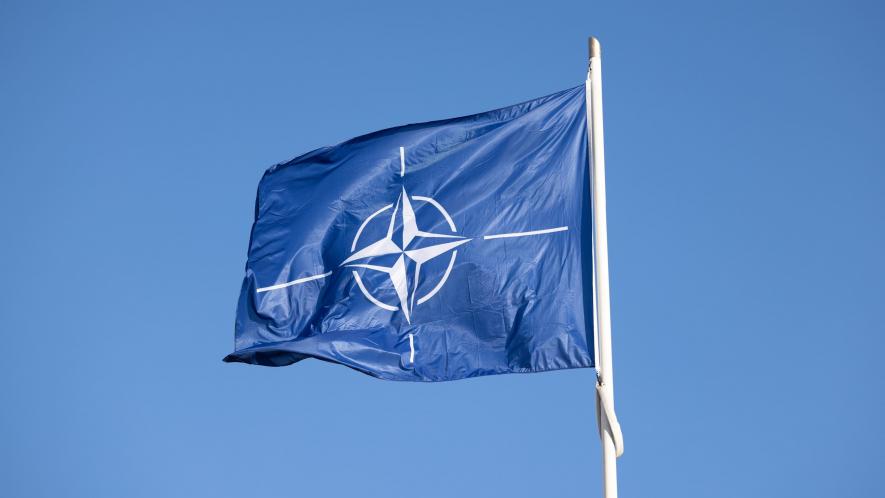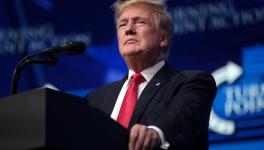Finland, Sweden and NATO: Democratic West Unites for More Wars

Image Courtesy: Wikimedia Commons
Finland joined NATO on 4 April this year. Sweden could join the Western military alliance in the near future. Even at the height of the Cold War between 1950 and 1990, these countries remained neutral, so joining NATO is a significant break from their recent history. Sweden is ranked second out of 179 countries in the Liberal Democracy Index of V-Dem Institute. Finland is ranked tenth.
On the other hand, NATO countries have waged the largest number of armed aggressions and wars in the past three decades. Hundreds of thousands of people have been killed, and state institutions and public utilities have been destroyed in Serbia (1999), Iraq (2003), Libya (2011), Syria and Afghanistan (2001-2021). Most of these armed aggressions were illegal in international law, and their perpetrators would have been tried for war crimes in a fair world. Why are seemingly peace-loving and democratic Finns and Swedes tying themselves to an aggressive military alliance?
According to the political leadership of the two countries, NATO membership is necessary to counter Russia after it invaded Ukraine in February 2022. However, if Russia and NATO are effectively at war in Ukraine, how do peace and security get served by joining one of the warring parties? As for Russia, there is hardly any evidence of a direct and declared threat to Finland and Sweden. Since 1992, Finland had a Friendship Treaty with Russia, which forbids armed aggression against each other. Was Russia about to break the deal? Even if that was the case, and by attacking Ukraine, Russia has shown bad faith towards its international obligations, why join a military alliance which has led illegal wars in many parts of the world?
Clearly, a differential value judgment concerning armed aggressions is at work. War crimes of one group of countries are lesser than those of other countries. The fact that victims of NATO and its members’ military aggressions have been countries of the Global South says a lot about the strategic preferences of Finland and Sweden. A good indicator is Finland’s minister of Foreign Trade and Development, who said it would stop aid to countries of the Global South that have not come out against Russia.
Leaving aside the Russian bogey, the real reason is the self-perception of what passes off as ‘the West’ and the current crisis it is facing.
Eurocentric Charms of ‘the West’
Critical literature on NATO often sees it as primarily the vehicle of US strategic interests. While not incorrect on specifics, such analyses miss the geopolitical significance of NATO in fostering a collective West. In a perceptive article on the Swedish and Finnish decision to enter NATO, journalist Lily Lynch explains why it is actually them ‘joining the West’ and what that implies.
While the United States undoubtedly commands all NATO operations, how even smaller NATO countries join its rampages is rarely understood. Belgian, Danish, Norwegian and Portuguese air forces were participants in the bombing of Serbia in 1999. According to one commentator, during the war on Libya in 2011, ‘little Denmark and Norway took as many targets as did Britain.’ These two liberal democracies are ranked first and third on the V-Dem index. But they did bomb Libya with gusto. The idea of the United States shepherding a bunch of reluctant allies or subservient minions does not match the reality.
‘The West’ fortified by NATO is a strong ideological, and political construct. In an address to the inauguration of the European Diplomatic Academy on 13 October 2022, Josep Borrell, the foreign policy chief of the European Union, called Europe a garden and the rest of the world a jungle. Borrell’s imagery succinctly combines the long-standing Eurocentric and Orientalist ideological currents in the West.
The liberal democratic credentials of the West are an essential part of its garden-like character, a Borrell might say. However, as Norway and Denmark demonstrate, democratic achievements are no constraint on bombing other countries. Of the top 25 countries on the V-Dem Liberal Democracy Index, only three (Switzerland, Costa Rica and Chile) are not part of NATO or associated with it. Eurocentric presumptions are too strong for a civilised behaviour expected from democracies.
The Eurocentrism of ‘the West’ would not be of much global significance, but since the success of industrial capitalism in Western Europe 200 years ago, it has been hegemonic. Not only the ruling classes of Western countries and sections of its popular classes, but social elites in the rest of the world also see the world through a Eurocentric lens. The material basis of this hegemony is economic and military dominance.
The short 20th century ushered by the Russian Revolution, later continued by anti-colonial struggles, did challenge this viewpoint. However, even before the USSR disintegrated in 1991, neo-liberal globalisation had helped Western countries re-establish economic domination. By the time Bush entered Iraq in 2003, only a clutch of bedraggled ‘rouge states’ (Iran, Iraq, North Korea, Libya and Cuba) and terrorist attacks from Islamic fundamentalist groups appeared standing in the way to the forever glory of ‘the West’.
Two decades later, the world looks different. Western countries are no longer at the centre of the global production of goods and services. The gross domestic product at purchasing power parity of Brazil, Russia, India, China and South Africa, the five BRICS countries, is $56 trillion or about 8% greater than that of the United States, Japan, Germany, United Kingdom, France, Italy and Canada of the G7. The BRICS economies are also growing at twice the rate. China’s share (including Hong Kong) of global goods exports in 2021 was 23%. By comparison, the European Union’s share was 15%, and the United States' 10%. If the growth of capitalism was key to Western domination, the development of capitalism in other countries seems to have unravelled that very domination.
The empire can and will strike back, particularly because the West still dominates in advanced technologies, including military hardware, software, and finance capital. Actions on these fronts require coordinated collective action. Not just the United States, many European countries have also banned the 5G technology of Chinese company Huawei and blocked transfers of advanced chip technology to China. Similarly, freezing foreign assets and sanctions against Russia would be impossible without collective action.
All such actions by the West, however, erode its hegemony. Other countries realise that they need economic strength and strategic autonomy for honourable survival. This explains why most countries in the Global South have refused to follow the West in sanctioning Russia.
Recent years have shaken the West out of its geo-strategic assumptions. The era of unipolarity ended in 2015 when Russia entered the Syrian civil war on the side of the Assad regime against Islamic fundamentalist groups supported by the West. Despite the United States Army’s bases in Northern and Eastern Syria and continuing occupation of practically a fourth of the country, Russian intervention was a decisive blow to anti-Assad forces and defeated the “regime change” plans of the West.
An intelligent Western leadership would have noticed the changed scenario and tried to evolve a modus vivendi with Russia to avoid further conflicts. Russia gave enough warnings about closer military integration of Ukraine with the West on its border, and proposed treaty-bound joint security architecture for Europe. Only Eurocentric hubris, a blind belief in the permanent paramountcy of the West, can explain the utter disregard for the emerging scenario.
The Russian invasion of Ukraine, right on the border of the West, to one it had guaranteed security, was a rude jolt. A perhaps even bigger shock is that the coordinated Western economic sanctions on Russia have not dented its economy. This is mainly because the major economies of the Global South have continued trading with it.
Sweden and Finland have long been politically and economically integrated into the West. Their decision to forego neutrality and join NATO shows deepening Western unity in the current crisis. Besides girdling up the West in a close military alliance, NATO is systematically building relationships with East Asian nations to contain China. For the first time, NATO’s 2022 Strategic Concept noted that developments in the Indo-Pacific directly affect Euro-Atlantic security. Japan, South Korea, Australia and New Zealand have so far had military pacts with the United States only.
Since the 2022 Madrid NATO Summit, heads of State and governments of these countries have started attending these summits, indicating a closer military integration with the West.
The unity of the West and its expansion to other parts of the world is adversarial in intent and purpose. Rather than find ways to avoid war, it assumes war is the only option. Its biggest failure is that it emerges from the same Eurocentric vision of the world whose weakening hold has created the current crisis.
Beyond Militarization
Any serious understanding of ways to avoid looming wars has to start with existing social contradictions. The increased militarization of the West, including Finland joining NATO and Sweden waiting in the wings for membership, is a sign of the march of neoliberalism. Lynch notes in her article how business interests in these countries are most enthusiastic about joining NATO. They foresee windfall profits from increased military spending. On the other hand, the youth, who will have to live through an emaciated welfare state and bear the burden of compulsory military conscription, are the biggest opponents. Many progressives in the West have noted that the European Commission and governments are using the war in Ukraine as a pretext to increase military spending while working people suffer the cost of living crisis.
Western governments may think that with Eurocentrism on their side, they can sell any foreign invasion to their citizens. However, every ideology has its sell-by date.
Many countries in the Global South are using the current crisis to come out of the West’s imperial hegemony. The emerging multi-polar scenario provides a unique opportunity for citizens of all countries to interact as equals. As the crisis of neoliberalism in the West deepens and its citizens search for alternatives, they would have an opportunity to join this emerging global community of equals and break free from the spell of Eurocentrism.
The author teaches physics at St Stephen’s College, University of Delhi. The views are personal.
Get the latest reports & analysis with people's perspective on Protests, movements & deep analytical videos, discussions of the current affairs in your Telegram app. Subscribe to NewsClick's Telegram channel & get Real-Time updates on stories, as they get published on our website.
























